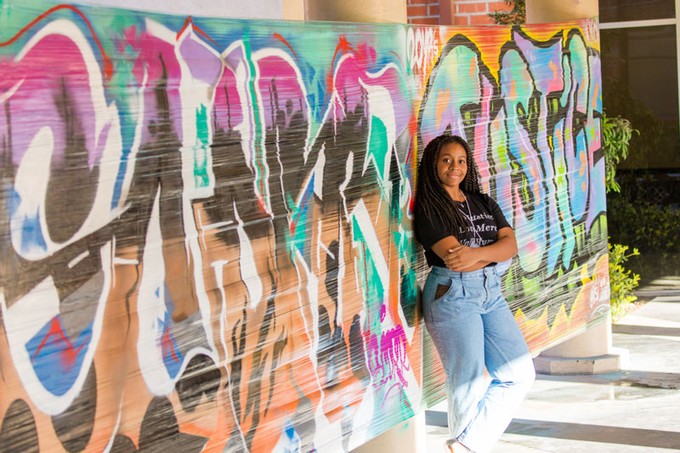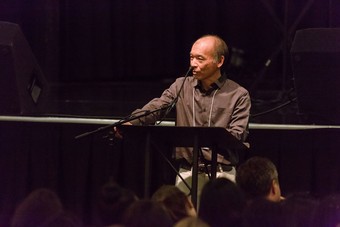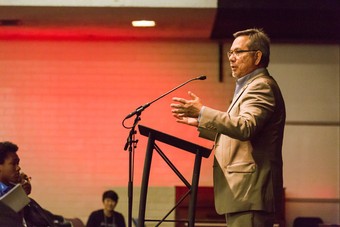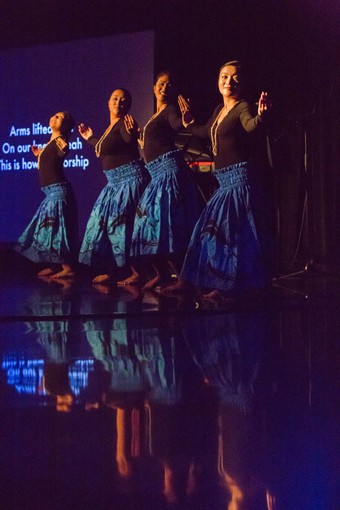
“Evangelical Colleges’ Diversity Problem.” That was the headline of a January 2016 feature article in The Chronicle of Higher Education, which explored hardships for minority students on Christian college campuses and pondered whether “there is something about evangelical colleges that heightens the challenges facing minority students and professors.”
Though member schools within the Council for Christian Colleges & Universities (CCCU) are seeing record enrollment of students of color (upwards of 50 percent minority enrollment at some schools), the resources and structures to support them are lagging behind.
“They have been promised an equal education, but they are actually experiencing a very different university and college than their white majority colleagues,” said Pete Menjares, the CCCU’s senior fellow for diversity. In contrast to what the viewbooks and website marketing might have led them to believe, most of the faculty, staff, senior administrators and boards of trustees are white, said Menjares, reflecting a homogeneity of leadership that doesn’t mirror the diversity of the student body, nor that of the surrounding culture.
“[Minority students] are asking for change,” said Menjares at a luncheon for faculty and staff at Biola on Feb. 19.
“They are asking for their faculty and administrators to know them and teach to their particular contexts, learning styles and frames of reference, so they aren’t constantly having to accommodate to white majority culture.”
Menjares, who worked for 18 years as a professor and administrator at Biola, pointed out that Christian colleges and universities represented the only higher education sector without a president of color.
“We do not currently have a president of color in our movement, and that’s an indictment upon us,” said Menjares.
Addressing the challenges for minority students on Christian college campuses, and raising awareness about the systems that may perpetuate these challenges, is one of the goals of SCORR, the Student Congress on Racial Reconciliation, which gathers hundreds on Biola’s campus each February.
On its 20th anniversary gathering this past Feb. 18-20, nearly 900 attendees from Biola and 15 other CCCU schools reflected on the legacy of SCORR and its ongoing importance in the landscape of Christian higher education.
The Origins of SCORR
In the summer of 1995, Glen Kinoshita, director of multi-ethnic programs and development, was working at Biola and lamented what he saw as a deficiency in diversity programming on campus. Having graduated from Biola as an undergraduate in 1988 and from Talbot School of Theology with an M.Div. in 1991, Kinoshita had experienced “many of the issues that a lack of diversity on a Christian campus brings.”

dramatically since first proposing it 20 years ago.
Compared with other campuses (especially secular campuses) which had conferences, classes, curricula and resources for minority students, Kinoshita perceived Christian colleges like Biola to be far behind.
To help address this deficiency, Kinoshita convened a few of his counterparts from other Christian campuses in the region and pitched to them an idea for an annual gathering that would bring together students and staff at Christian colleges who were interested in diversity work. The conference would be a time to celebrate the theological value of diversity, share stories, support one another and go deeper in the reconciliation conversation. Kinoshita received overwhelming support for the idea, and a few months later, in 1996, the first conference was held.
Originally called the Western Regional Multicultural Leadership Conference, the Friday evening and all-day Saturday event drew about 70 off-campus registrants in its inaugural year. For the first couple of years, the conference gathered mainly students from the Southern California region. In 2000, the conference name changed to Student Congress on Racial Reconciliation (SCORR) and began to draw registrants from Christian colleges along the West Coast.
Though originally intended as a refuge for minority students who felt alone or underserved on their campuses, the event gradually expanded to include diversity education and awareness programming. Other departments on Biola’s campus began to participate and some conference sessions were geared specifically to students or faculty/staff who were skeptical about or new to the reconciliation conversation. Another aspect of SCORR that has grown has been the presence of the arts, with drama, graffiti art, spoken word and various styles of worship playing an increasingly prominent role in the conference.
In its 20 years, the conference has experienced steady growth in attendance and reputation, today drawing students from as far away as Seattle Pacific University, Moody Bible Institute in Chicago and Cedarville University in Ohio. The 2015 conference drew 421 off-campus registrants from 15 different colleges and universities.
Over the years, speakers at SCORR have included people like Richard Twiss, Jane Higa (Westmont College), Kenneth Ulmer (Faithful Central Bible Church), Soong Chan Rah (North Park Seminary), Efrem Smith (World Impact) and many others.
And while the scope of SCORR has expanded, its vision has remained the same: to help attendees “develop a greater vision for enhancing diversity, promoting biblical justice and inspiring leadership that results in a lifelong process of building God’s kingdom on earth.”
More Needed Than Ever
At a time when racial incidents have been on the rise in America and college campuses have been sites of race-related protests and incidents of racism, the mission of SCORR is more needed than ever, said Kinoshita. The tumult in culture should serve as a wake-up call to the ongoing wounds and desperate need for reconciliation, though our efforts should go beyond merely reacting to incidents when they arise or responding to tension when it becomes unavoidable, he said.
“We need to think proactively about diversity as a value that defines us, that we want to excel and pursue this in our teaching, scholarship, service, campus activities,” he said. “This is the kingdom of God. It’s the body of Christ, the one new humanity. It’s who we are as believers.”
Kinoshita said that one of the goals of SCORR is to facilitate a paradigm shift from thinking of diversity as a “problem to address,” which he says is “deficit thinking,” to thinking of diversity as an asset, a win for everybody. In addition to its biblical grounding, valuing diversity at a place like Biola better prepares students to thrive in an increasingly diverse nation and world, he said.
SCORR is one way of working toward Aspiration 5 of Biola’s 2012–22 University Plan, said Kinoshita, citing the plan’s call for Biola’s campus to “more closely reflect the demographics of our geographic region” and for students to be prepared “to be intellectually and experientially cross-cultural Christians.”

served as a featured speaker at the 2016 conference.
“Living in a monoculture is not a reality for most of the students you are serving,” said alumna and longtime SCORR attendee Erika Bertling (’94) at this year’s SCORR faculty/staff luncheon. Learning cross-cultural skills is not a luxury for college students today, she said. “It’s a necessity.”
Menjares echoes this sense of urgency, noting that the future of the evangelical movement “hinges on our success in navigating the seas of diversity. If we fail to do so, our movement will become irrelevant within a generation,” he said.
Alicia Miller Andre (’10), coordinator of multi-ethnic programs and development at Biola and the conference organizer for SCORR, believes that churches and Christian institutions like Biola have an opportunity to create new narratives and visions for what healthy diversity looks like, at a time when many are discouraged by setbacks or slow progress.
“In the world today we have a dearth of creative imagination,” she said. “We need people of faith to speak into that and to show that there are other ways of living and being and doing in the world.”
Student Government Association president Taylor Stribbling (’16), who emceed some of the SCORR sessions this year, said the conference is important because it gives Biola students opportunities to acknowledge existing racial and social injustices.
“We can’t truly enact change without first acknowledging the issues at hand,” said Stribbling, who hopes to see more students engaging with one another because of SCORR. “My prayer is that God would smile upon us as we choose to dive deeper into conversations and grow stronger together through his word.”
Embracing Dialogue about Diversity
The presence of SCORR hasn’t always been comfortable, or understood, by everyone on Biola’s campus. The conference can be particularly challenging for those unaccustomed to these sorts of dialogues, said Kinoshita. For those in the majority there can be a “culture of comfort and being in control,” he said, “and SCORR tends to disrupt that for the purposes of putting us into a growth process that we see is very biblical.”
When SCORR began 20 years ago, Dean of Student Engagement John Back (’89) remembers “recoiling a bit inside.”
“I found myself asking, ‘Who do I need to reconcile with?’” said Back, who today sees SCORR as a valuable reminder that reconciliation is a necessary and ongoing process.
“Intentionally calling our students out to focus on how together we can address difficult conversations is not only healthy for our community, but critical to our development as individuals,” Back said. “May we each have the courage to step into the conversation.”

means "The Nations Praise God" — leads worship.
Courageous conversations about reconciliation are indeed crucial, but they can be uncomfortable. That’s why humility and listening are necessary in these discussions, said Andre.
“It’s always helpful to acknowledge what we don’t know or what we don’t understand,” she said, noting this involves sitting down and hearing the stories of others.
“This isn’t just about statistics. This is about people’s lives,” she said. “For me to acknowledge that I don’t know what that person’s experience is like, to ask myself, ‘What if we really are interacting in the same world but viewing it completely differently and having completely different experiences?’ That was really helpful for me in my own process of growth.”
Biola staff member Phillip Wallace acknowledges that SCORR can be an uncomfortable experience for his white colleagues and friends, but he urges them to attend anyway, to “be with us, to be uncomfortable for the sake of Christ, even if you feel attacked.”
Wallace, a senior research analyst in Biola’s Office of University Planning, says it can be discouraging that even as many minority students travel across the country to attend SCORR, so many in Biola’s own community are unwilling to cross the campus to attend.
“It’s not communicating reciprocity when you have the opportunity to ‘opt out’ and so often take it,” said Wallace, who is black. “I don’t have the ability to opt out. I live a life of discomfort. You really can’t endure a couple hours of discomfort with me?”
Jamie Whitaker Campbell (’04), interim dean of humanities and social sciences, first attended SCORR as a student and said she has been blessed and refined by the relational and conversational focus of the conference.
“I see the deep value of the work, conversations and connections provided by SCORR in making our call to be partners in reconciliation a reality in Christian colleges,” she said. “This work is difficult, requiring relationship. For 20 years, SCORR has been a relationship-forging incubator for this Spirit-led work.”
Alumna Nancy Davong (’14) works as a nurse at Cedars-Sinai hospital in Los Angeles and has attended SCORR for the past six years. For her, the way the conference creates space for conversation and relationship with people who disagree helped prepared her to thrive in a diverse workplace.
“My involvement with SCORR increased my intercultural empathy and equipped me with leadership skills that I use everyday with my diverse coworkers and patients,” she said.
Provost and Senior Vice President Deborah Taylor (’94, M.A.Ed. ’01), who has attended SCORR for the past eight years, also said that her journey toward becoming more culturally competent has been shaped and enhanced by the conference.
“Listening to the stories and wisdom from diverse voices has increased my empathy and strengthened my relationships in the Biola community,” she said. “I consider this annual conference one of Biola’s more significant contributions to the work of advancing the kingdom.”
Looking Back and Looking Ahead
These sorts of testimonies are encouraging to Kinoshita and Andre, who have endeavored through SCORR to increase intercultural competency and raise awareness of the biblical mandate and value of diversity, at Biola and beyond.
Kinoshita said that he has been encouraged to see more and more departments on Biola’s campus become involved in SCORR. He is also heartened to see broader efforts on campus related to diversity, including more chapels featuring diverse speakers and forms of worship, more faculty with passion and awareness of these issues, and this year’s hiring of Pamela Christian as vice provost for inclusion and cross-cultural engagement.
Andre said she has perceived a “cultural shift” on campus as there are more and more people “who understand, or want to understand, or are allies of justice and diversity and making an inclusive campus.”
But there is still a long way to go. Looking forward to the next few decades of SCORR, Andre hopes to see more campuswide ownership of the conference, and potentially more tailored tracks for faculty, staff and students. She also hopes to continue building relationships with outside organizations through the SCORR Action Network, as a way to help students take what they learn at the conference and apply it in action through established and trusted organizations.
As Kinoshita looks forward, he emphasizes the importance of adopting humility and committing to a life of growth in these areas.
“The Christian life is a journey,” he said. “We are constantly growing, being conformed to the image of Christ. Diversity, inclusion, reconciliation and shalom are all themes that mark the body of Christ, that mark Christ-likeness. There can be a defensiveness when we hear the word diversity. But if we shift and embrace this as a passion to be pursued, one that enriches our lives and those around us, it would be amazing.”
 Biola University
Biola University
.jpg)

